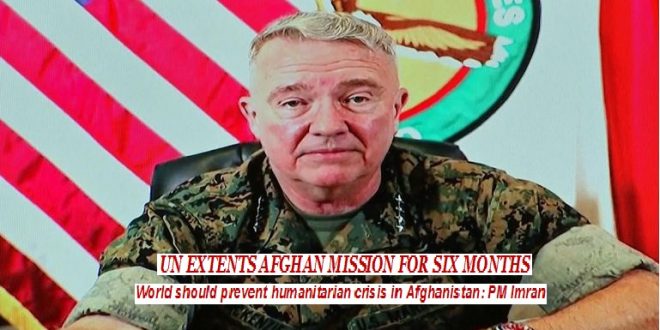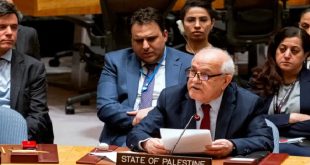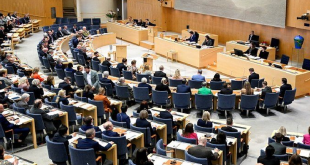18-09-2021
By SJA Jafri + Bureau Report + Agencies
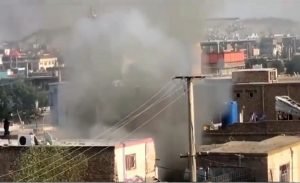 KABUL/ ISLAMABAD/ UNITED NATIONS: General Frank McKenzie, the head of the US Central Command, acknowledged that a US drone raid in Afghanistan’s capital, Kabul, late in August killed 10 civilians, including children.
KABUL/ ISLAMABAD/ UNITED NATIONS: General Frank McKenzie, the head of the US Central Command, acknowledged that a US drone raid in Afghanistan’s capital, Kabul, late in August killed 10 civilians, including children.
McKenzie said on Friday that it was “unlikely” that those killed were associated with the Islamic State in Khorasan Province, ISKP (ISIS-K), as originally claimed by the US military.
“Having thoroughly reviewed the findings of the investigation and the supporting analysis by interagency partners, I am now convinced that as many as 10 civilians, including up to seven children, were tragically killed in that strike,” McKenzie said.
The US general offered “profound condolences” to the families of the victims, stressing that the attack was taken with the “earnest belief” that it would prevent an imminent attack on the airport where American forces were evacuating people.
“It was a mistake, and I offer my sincere apology,” McKenzie said. “As a combatant commander, I am fully responsible for this strike and this tragic outcome.”
US Secretary of Defense Lloyd Austin offered condolences for the attack’s victims on Friday and announced a “thorough review” of the investigation into the attack that will also consider the need to alter “strike authorities, procedures and processes” in the future.
“We apologize, and we will endeavor to learn from this horrible mistake,” Austin said in a statement.
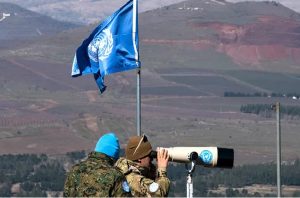 Pentagon acknowledges ‘mistakes’
Pentagon acknowledges ‘mistakes’
The strike on August 29 came days after a suicide bombing near the airport, claimed by ISKP, killed at least 175 people, including 13 US service members.
The US pulled all of its forces from Afghanistan by the end of last month as the Taliban took over the country, capturing Kabul in mid-August.
US troops, which remained in control of the airport in Kabul as the Taliban took control of the capital, conducted a massive and chaotic evacuation operation to airlift American citizens, third-country nationals and Afghan allies.
American officials warned of “credible” threats to the airport by ISKP throughout the evacuation operation.
Family members of the August 29 drone raid victims told media after the attack that the 10 people killed ranged in age from two to 40 years old.
“They were innocent, helpless children,” Aimal Ahmadi, whose nieces and nephews were killed in the attack, told media.
Despite early media reports of civilian casualties, the Pentagon initially defended the attack, stressing that it killed ISKP operatives.
Mark Milley, the top US general, called the drone attack “righteous” on September 1.
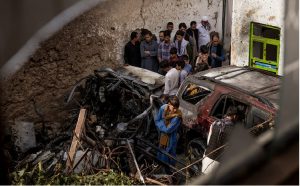 “I don’t want to influence the outcome of an investigation, but at this point we think that the procedures were correctly followed and it was a righteous strike,” Milley said then.
“I don’t want to influence the outcome of an investigation, but at this point we think that the procedures were correctly followed and it was a righteous strike,” Milley said then.
Pentagon spokesman John Kirby said Austin has asked for a review of the drone raid investigation to include accountability for the measures used to choose the target.
Congressman Adam Schiff, a Democrat who chairs the House Intelligence Committee, raised concerns about “accuracy and completeness of public statements” after the drone attack.
“In acknowledging that error, the Department of Defense has taken the first step towards transparency and accountability. And after such a devastating failure – one that, by the Department’s estimate, killed 10 civilians, at least 7 of them children – it cannot be the last step,” Schiff said in a statement.
“We need to know what went wrong in the hours and minutes leading up to the strike to prevent similar tragedies in the future.”
On Friday, McKenzie said the Pentagon stood by the raid early on based on the intelligence available at the time, noting that he ordered a “comprehensive review” of the footage from the attack 24 hours after it took place.
“I was confident that the strike had averted an imminent threat to our forces at the airport,” McKenzie said at a news briefing.
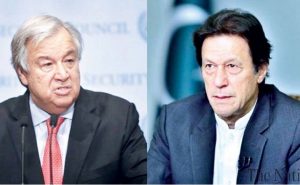 “Based upon that assessment, I and other leaders in the Department [of Defense] repeatedly asserted the validity of this strike. I’m here today to set the record straight and acknowledge our mistakes.”
“Based upon that assessment, I and other leaders in the Department [of Defense] repeatedly asserted the validity of this strike. I’m here today to set the record straight and acknowledge our mistakes.”
US considering compensation for families
McKenzie described a series of activities by the vehicle targeted by the raid that gave the impression that it was linked to a possible attack on the airport, including a stop at a building associated with ISKP operatives.
The Pentagon officials initially said that secondary blasts that followed the drone attack indicated that the vehicle was carrying explosives.
On Friday, McKenzie appeared to acknowledge that the early assessment was faulty.
“Subsequent analysis could not rule out the presence of a small amount of explosive material but determined that the most likely cause was the ignition of gas from a propane tank located immediately behind the car,” he said.
McKenzie said the US is considering “ex gratia” financial compensation for the families of the victims, but he noted that it is difficult to reach out to people on the ground in Afghanistan now.
Amnesty International welcomed the acknowledgement of civil casualties by the US military on Friday but called for prosecuting those “suspected of criminal responsibility” in the attack.
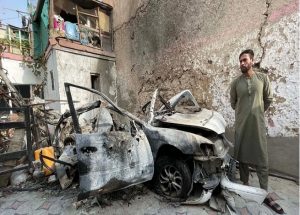 “Survivors and families of the victims should be kept informed of the progress of the investigation and be given full reparation,” Brian Castner, senior crisis adviser with Amnesty’s crisis response program, said in a statement.
“Survivors and families of the victims should be kept informed of the progress of the investigation and be given full reparation,” Brian Castner, senior crisis adviser with Amnesty’s crisis response program, said in a statement.
“It should be noted that the US military was only forced to admit to its failure in this strike because of the current global scrutiny on Afghanistan.”
Earlier, the UN Security Council voted Friday to extend the UN mission in Afghanistan for six months and called on the Taliban to create an inclusive government.
The 15-member council acted in a resolution passed unanimously on the UNAMA political mission, which deals with development issues, among others, not peacekeeping.
The document stressed “the importance of the establishment of an inclusive and representative government,” although Afghanistan’s new rulers have formed a government made up only of Taliban members and no women.
The resolution also calls for “full, equal and meaningful participation of women, and upholding human rights, including for women, children and minorities.”
It was drafted by Estonia and Norway, which welcomed the unanimous passage.
In August a council resolution calling for freedom of movement for Afghans wishing to leave the country after the Taliban takeover won 13 votes, as Russia and China abstained.
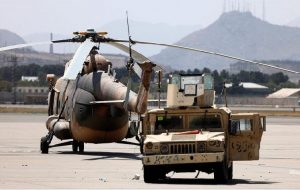 The text approved Friday says the UN will continue to play an “important role” in promoting peace and stability in Afghanistan.
The text approved Friday says the UN will continue to play an “important role” in promoting peace and stability in Afghanistan.
Diplomats said the Taliban did not object to the UN mandate being renewed.
“They are obliged to be more flexible,” an Afghanistan specialist at the UN said.
“They are more pragmatic” than they were in the first stint in power in the 1990s, the person said. The Taliban then were known to be very strict in their enforcement of Islamic law.
“The Taliban need the UN and this is our leverage” to have an influence on their decision making, the specialist told media.
The council asked Secretary-General Antonio Guterres to brief it every other month on the situation in Afghanistan until the mandate is due again to expire in March 2022.
It also wants a written report on the future of the mission by January 31.
In recent weeks several NGOs such as Amnesty International and Human Rights Watch have pressed for the UN and its 2,000 staffers in Afghanistan to stay in place to report on human rights abuses.
“There’s little evidence to suggest the Taliban will comply with international human rights law, especially the rights of women and girls,” said Louis Charbonneau, UN director at Human Rights Watch, welcoming the mission extension.
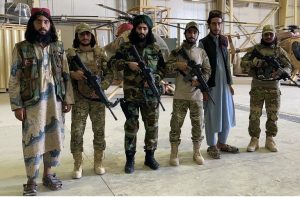 “UNAMA will need to regularly and publicly report on abuses while helping meet the humanitarian needs of the Afghan people.”
“UNAMA will need to regularly and publicly report on abuses while helping meet the humanitarian needs of the Afghan people.”
Meanwhile, Pakistani Prime Minister (PM) Imran Khan on Friday said that the international community should take steps to prevent humanitarian crises in Afghanistan and help stabilize its economy.
Per a statement issued by the Prime Minister’s Office, the premier met the Chinese state councilor and Foreign Minister Wang Yi in Dushanbe on Friday on the sidelines of the Shanghai Cooperation Organization Council of Heads of State.
PM Imran Khan conveyed cordial greetings to his Chinese counterpart and President Xi Jinping and appreciated China’s support in assisting Pakistan’s fight against the COVID-19 pandemic.
The premier said that the world nations should remain engaged in the support of Afghan people, while sharing views on the regional situation at the meeting, the statement added.
He underlined that a peaceful and stable Afghanistan was of critical importance for Pakistan and the region. In this perspective, Pakistan had assiduously supported the Afghan peace process, he said.
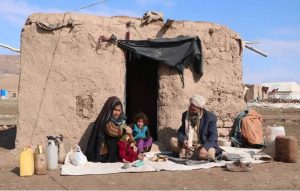 Speaking on the matters relating to Pak-China bilateral relations and China Pakistan Economic Corridor, PM Imran Khan said that Pakistan and China were “iron brothers” and strategic partners.
Speaking on the matters relating to Pak-China bilateral relations and China Pakistan Economic Corridor, PM Imran Khan said that Pakistan and China were “iron brothers” and strategic partners.
He maintained that CPEC was a transformation project and both sides were working on its timely completion.
It was agreed that the two sides would maintain the momentum of high-level exchanges and closely coordinate on all issues of common interest.
The prime minister attended the 20th Shanghai Cooperation Organization Council of Heads of State (SCO-CHS) Summit in Tajikistan’s capital earlier today.
Pakistan and China had maintained close collaboration for the meeting of six neighboring countries of Afghanistan for a coordinated regional approach.
 Pressmediaofindia
Pressmediaofindia
